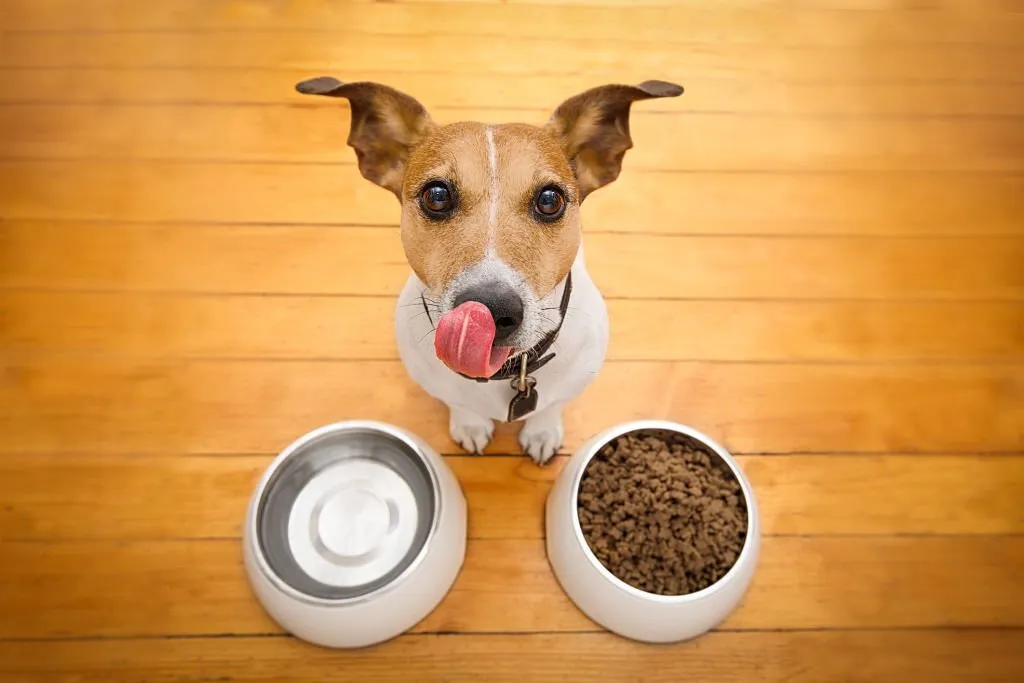Introduction
Feeding your dog the right amount of food is crucial for their overall health and well-being. Just like humans, dogs require a balanced and nutritious diet to maintain a healthy weight, strong immune system, and optimal energy levels. In this blog post, we will cover everything you need to know about feeding your dog, including their nutritional needs, factors that affect their food intake, how to calculate their daily caloric requirements, choosing high-quality dog food, reading dog food labels and ingredients, common mistakes to avoid, monitoring your dog’s weight, feeding your dog according to their life stage and activity level, special considerations for dogs with health issues, and tips for maintaining a healthy and balanced diet.

Understanding Your Dog’s Nutritional Needs
Protein, fat, and carbohydrates are the three macronutrients that dogs require in their diet. Protein is essential for building and repairing tissues, while fat provides energy and helps with nutrient absorption. Carbohydrates provide energy and fiber. In addition to these macronutrients, dogs also require essential vitamins and minerals such as vitamin A, vitamin D, calcium, and phosphorus.
To determine your dog’s ideal body condition score, you can use a visual guide that assesses their body shape and weight. A healthy dog should have a waistline and ribs that are easily felt but not visible. If your dog is overweight or underweight, you may need to adjust their food intake accordingly.
Factors That Affect Your Dog’s Food Intake
Age, breed, and size of your dog can all affect their food intake. Puppies and young dogs require more calories than adult dogs, while senior dogs may require fewer calories. Larger breeds may require more food than smaller breeds. Activity level and exercise routine also play a role in your dog’s food intake, as more active dogs require more calories. Health conditions and medications can also affect your dog’s appetite and food intake.
How to Calculate Your Dog’s Daily Caloric Requirements
To calculate your dog’s daily caloric requirements, you can use a formula that takes into account their weight, activity level, and life stage. For example, a moderately active adult dog weighing 50 pounds may require around 1,000-1,200 calories per day. However, it’s important to note that this is just a general guideline and your dog’s individual needs may vary.
The Importance of Choosing High-Quality Dog Food
Feeding your dog high-quality food can provide numerous benefits, including better digestion, improved immune function, and a healthier coat and skin. Look for dog food brands that use high-quality ingredients and avoid fillers and by-products. You can also consult with your veterinarian for recommendations on the best dog food brands for your dog’s specific needs.
How to Read Dog Food Labels and Ingredients
Understanding the ingredients list on dog food packaging can help you make informed decisions about what to feed your dog. Look for dog food brands that list high-quality protein sources as the first ingredient, such as chicken, beef, or fish. Avoid dog food brands that contain fillers and by-products, as well as artificial preservatives and colors.

Common Mistakes When Feeding Your Dog
Overfeeding or underfeeding your dog can lead to health problems such as obesity or malnutrition. Feeding your dog table scraps or human food can also be harmful to their health, as it can lead to digestive issues and nutrient imbalances. Make sure to provide your dog with fresh, clean water at all times.
How to Monitor Your Dog’s Weight and Adjust Food Intake
Regularly weighing your dog and tracking their weight over time can help you monitor their overall health and adjust their food intake as needed. If your dog is gaining weight, you may need to reduce their food intake or increase their exercise. If your dog is losing weight, you may need to increase their food intake or consult with your veterinarian to rule out any underlying health issues.
Feeding Your Dog According to Their Life Stage and Activity Level
Different life stages and activity levels require different nutritional needs. Puppies and young dogs require more calories and protein than adult dogs, while senior dogs may require fewer calories and more fiber. More active dogs require more calories than less active dogs. Make sure to adjust your dog’s food intake accordingly based on their individual needs.
Special Considerations for Dogs with Health Issues
Dogs with allergies, digestive issues, or other health conditions may require special diets that address their specific needs. Consult with your veterinarian to determine the best food for your dog’s specific health needs.
Tips for Maintaining a Healthy and Balanced Diet for Your Dog
In addition to feeding your dog high-quality food, you can also incorporate treats and supplements into their diet to provide additional nutrients and variety. Make sure to choose treats and supplements that are appropriate for your dog’s size and health needs.
Conclusion
Feeding your dog the right amount of food and providing them with a balanced and nutritious diet is essential for their overall health and well-being. By understanding your dog’s nutritional needs, factors that affect their food intake, and how to choose high-quality dog food, you can help ensure that your dog stays healthy and happy. Remember to consult with your veterinarian for personalized advice on your dog’s nutritional needs.

